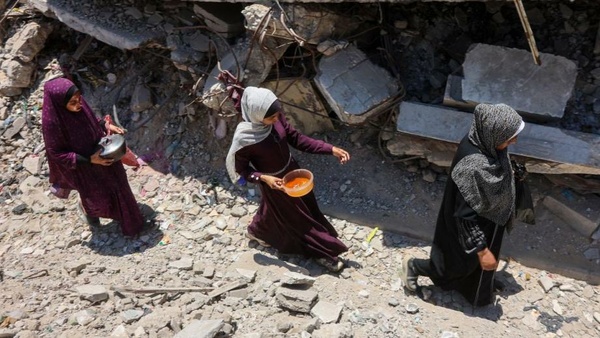
Gaza – Saba:
Amid the drone of warplanes and the roar of tanks, 50-year-old Sawsan Akila was washing her children’s clothes in the courtyard of a relative’s house—her temporary refuge after being displaced from Juhr al-Dik area, south of Gaza City, to escape Israeli enemy shelling that makes no distinction between civilians and combatants.
Moments later, an Israeli enemy tank shell exploded nearby. Sawsan lost two fingers from her hand, and her stepdaughter Nourhan, who was helping her, was killed instantly.
With anguish, Sawsan told Filastin newspaper: “Nourhan wasn’t just my daughter—she was my other hand. When she killed, I felt like I lost my whole heart, not just two fingers.”
This tragedy, which occurred in December 2024, was one in a series of repeated displacements since the start of the Israeli aggression on the Gaza Strip. Sawsan had already fled her home with her seven children, escaping the relentless bombardment targeting densely populated residential areas.
After her injury, Sawsan was taken to a hospital, where doctors amputated two fingers from her right hand. But the loss was not just physical—it stripped her of her ability to care for her children as she once had. Simple tasks like cooking, washing, or even combing her hair became painful and required assistance.
“I used to love cooking for my children,” she says.
“Now, even opening a pot lid is a struggle. Everything hurts and reminds me of my lost hands.”
Following that fateful day, Sawsan also received news of the martyrdom of her stepson, Fahmi, who had treated her like a mother.
“Fahmi always checked on me,” she recalls.
“He was more compassionate than my own children. He never let me need anything. I’m not afraid of war—I’m afraid of what the war takes from us.”
Sawsan now lives in a temporary shelter at al-Azhar University in Gaza with her remaining family. Despite the deep emotional wounds and physical limitations, she continues for the sake of her children.
Through tears, she concludes: “I’m trying to be strong, but the pain is inside me. It never leaves—and it grows with each passing day.”
This personal tragedy unfolds as thousands of Palestinians in Gaza endure dire humanitarian conditions, repeated displacement, and a total collapse of basic services. Shelters are critically lacking electricity, water, and medical supplies, while Israeli enemy attacks continue to claim hundreds of lives and cause widespread destruction.
Amid the drone of warplanes and the roar of tanks, 50-year-old Sawsan Akila was washing her children’s clothes in the courtyard of a relative’s house—her temporary refuge after being displaced from Juhr al-Dik area, south of Gaza City, to escape Israeli enemy shelling that makes no distinction between civilians and combatants.
Moments later, an Israeli enemy tank shell exploded nearby. Sawsan lost two fingers from her hand, and her stepdaughter Nourhan, who was helping her, was killed instantly.
With anguish, Sawsan told Filastin newspaper: “Nourhan wasn’t just my daughter—she was my other hand. When she killed, I felt like I lost my whole heart, not just two fingers.”
This tragedy, which occurred in December 2024, was one in a series of repeated displacements since the start of the Israeli aggression on the Gaza Strip. Sawsan had already fled her home with her seven children, escaping the relentless bombardment targeting densely populated residential areas.
After her injury, Sawsan was taken to a hospital, where doctors amputated two fingers from her right hand. But the loss was not just physical—it stripped her of her ability to care for her children as she once had. Simple tasks like cooking, washing, or even combing her hair became painful and required assistance.
“I used to love cooking for my children,” she says.
“Now, even opening a pot lid is a struggle. Everything hurts and reminds me of my lost hands.”
Following that fateful day, Sawsan also received news of the martyrdom of her stepson, Fahmi, who had treated her like a mother.
“Fahmi always checked on me,” she recalls.
“He was more compassionate than my own children. He never let me need anything. I’m not afraid of war—I’m afraid of what the war takes from us.”
Sawsan now lives in a temporary shelter at al-Azhar University in Gaza with her remaining family. Despite the deep emotional wounds and physical limitations, she continues for the sake of her children.
Through tears, she concludes: “I’m trying to be strong, but the pain is inside me. It never leaves—and it grows with each passing day.”
This personal tragedy unfolds as thousands of Palestinians in Gaza endure dire humanitarian conditions, repeated displacement, and a total collapse of basic services. Shelters are critically lacking electricity, water, and medical supplies, while Israeli enemy attacks continue to claim hundreds of lives and cause widespread destruction.